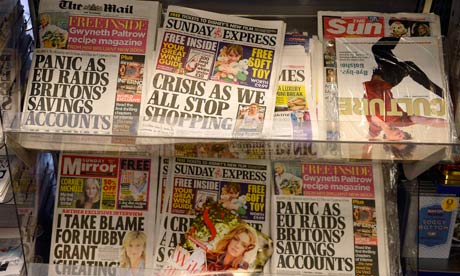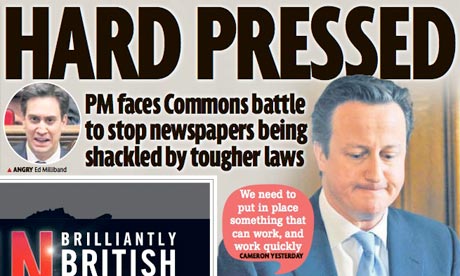So... we initially had the Tories seeking to minimally apply Leveson, backed by most of the press (The Guardian and Indie took a separate line broadly favouring tougher regulation), seeing Cameron, otherwise criticised by the right-wing press for being insufficiently right-wing(!), hailed as a hero defending ancient freedoms.See Media Guardian's press regulation micro-site for lots more news and analysis on this.
Daily Mail splash on the battle over press regulation
Belatedly, the 3 big parties came to an agreement, and a beefed-up self-regulator, backed by Royal Charter (and with the threat of 'exemplary damages' hanging over any publications who refused to sign up), with no press industry right of veto over the members of the new organisation, was agreed. Notoriously, this was agreed at a meeting that ran into the early hours and included Hacked Off representatives.
 |
| Guardian led on the story |
They also think they've managed to blocked the politicians' hopes of setting up a royal chartered organisation: according to their legal advice, if any royal charter is rivalled or seen as controversial it must be rejected.
The government, and major parties, say they're determined to press ahead.
The press are adamant they won't co-operate.
There is some divide amongst MPs: the influential Tory Chair of the Culture Select Committee, John Whittingdale, has written in the Sun stating he loves their proposal and would back it over the government's.
Its a year and a half since the PCC announced it was scrapping itself. It continues, with its successor still to be settled on.
Who will win this battle of wills and public opinion?
 |
| Sun was blunt in its threat to parliament |
(article created after reading Roy Greenslade's typically sharp analysis, and Lisa O'Carroll's analysis of the likely political response to the press plan: http://www.guardian.co.uk/media/greenslade/2013/apr/26/press-regulation-national-newspapers and http://www.guardian.co.uk/media/2013/apr/29/newspaper-industry-royal-charter-david-cameron)







